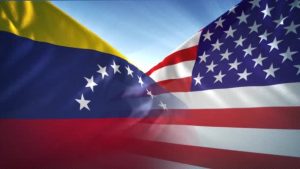By: Andrea Ochoa Lozano, 2L
The international legal community is seemingly making fun of Venezuela’s latest ploy—requesting consultations with the United States through the World Trade Organization (WTO) for trade discrimination. As of December 18, 2018, the Venezuelan government claims that certain economic sanctions—placed by the United States—discriminate goods of Venezuelan origin and disallow fair importation into the United States. In requesting consultations, Venezuela claims that certain American statutes, regulations, and Executive Orders imposing economic sanctions violate the 1994 GATT WTO’s 1994 General Agreement on Tariffs and Trade. Venezuela claims that the United States offers advantages to other countries and the countries’ domestic producers via the economic sanctions. Upon first look, Venezuela seems to claim a violation of the Most Favored Nation (MFN) and the National Treatment principles, and important standard for enforcing non-discriminatory trade between WTO members. However, it appears that Venezuela’s claim in regard to the discrimination of goods is completely baseless.
The United States placed certain individuals linked to the current Venezuelan government onto the United States’ Specially Designated Nationals and Blocked Persons List (SDN). Members on this list are both banned from entering the States and unable to use assets in the country. Executive Order 13692 by President Obama in 2017 and 31 CFR Part 591 effectively placed certain Venezuelan individuals who have strong ties to the current regime and their companies on the SDN list. Venezuela claims that the United States violated Article I:1 because the country does not subject other WTO Member countries to similar trade-restrictive measures. Instead, Venezuelan goods face regulations on who is allowed to import goods, and unfair market opportunities after importation. Furthermore, the United States allegedly violated Article III:4 because it gives products of Venezuelan origin treatment less favorable than that of domestic origin. Additionally, they claim that products of Venezuelan origin face greater regulatory burdens and unfair market opportunities as a result of these coercive trade-restrictive measures. The United States supposedly violated Article V:2 because 31 CFR Part 591 requires the detention and seizure of certain goods of Venezuelan origin transiting through the United States en route to a WTO Member country. Lastly, Venezuela claims that the sanctions constitute restrictions outside those allowed by Article XI:1 because the United States is placing quantitative restrictions en route to another Member.
However, Venezuela fails to demonstrate exactly which products are being treated unfavorably and why United States’ sanctions specifically affect trade relations. According to Article 4:4 of the DSU, a request for consultations must be submitted in writing and must include the measures at issue and indicate the legal basis for the complaint. Based on the proposed claim, it is very unlikely that WTO will go through with the Dispute Settlement Process because the claim fails to be sufficiently precise.





